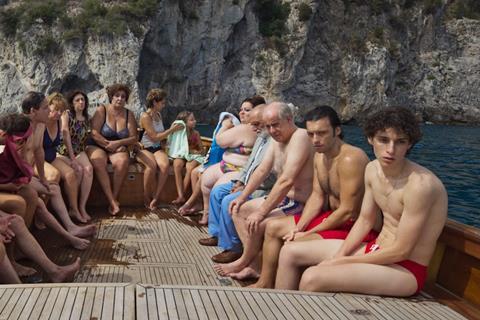Paolo Sorrentino delivers a highly personal memoir that truly breathes on the big screen

Dir. Paolo Sorrentino. Italy. 2021. 130 mins.
There’s no mistaking the hand of Paolo Sorrentino in his latest work, although this time the bravura signature has a rather more gentle flourish. His ninth feature film is unmistakeably his most personal, and directly autobiographical: a comedy-drama tenderly recalling the director’s Neapolitan youth. While The Hand of God markedly reins in the stylistic excesses of Sorrentino’s last feature, 2018 political diptych Loro, the boisterousness remains, as does the unreconstructed maleness that has often been a jarring mannerism in his work. But new intimacy also yields a lightness and tenderness that are a welcome addition to Sorrentino’s palette. While it is eventually destined for Netflix streaming, the film has a visual expansiveness that truly breathes on the big screen, which should make it a hit on this autumn’s festival circuit, and a considerable pull domestically: it opens theatrically in Italy in late November, and elsewhere in December.
One of cinema’s least sentimental family memoirs since Fellini’s own
Drawing on episodes from the director’s youth – and returning to the football obsessions of his first feature, 2001’s One Man Up - the film has its thematic centre in the Neapolitan population’s passion for Diego Maradona, who joined Napoli football club in 1984 before scoring his notorious ‘hand of God’ goal for Argentina two years later. But the title also refers to the notion of divine intervention.
That theme emerges in the film’s characteristically hallucinatory opening, as Patrizia, a woman in early middle age (played by Luisa Ranieri, and photographed to place preposterous emphasis on her breasts) encounters a man who introduces himself as Neapolitan patron saint Gennaro, then presents her to a mysterious figure of local legend, the ‘Little Monk’. Patrizia’s return home to a jealousy-crazed husband places the film back in a register of amplified realism, and introduces us to the Schisa family. They include teenage Fabietto, or Fabiè (Filippo Scotti), Patrizia’s besotted nephew and the film’s Sorrentino surrogate; aspiring actor brother Marchino (Marlon Joubert); Communist bank official dad Saverio (Sorrentino fixture Toni Servillo); and irrepressible prankster mother Maria (Teresa Saponangelo).
The film’s first part establishes a sprawling cast, notably at a family banquet al fresco, some characters introduced in brief cartoonish touches, and typically larger than life: notably, a scowling matriarch in furs, stuffing herself with mozzarella and dispensing juicy oaths in Neapolitan dialect; and an overweight young woman whose new beau is a bumptious 70-year-old who speaks through an electronic voice box. Later, the focus turns to Maradona, the whole city erupting – at a critical moment for the family – at that legendary goal.
Gradually, however, the comedy yields to a more rueful tone, as Sorrentino unveils the family’s secrets and sorrows, and a beautifully handled, almost wordless slow-burn sequence builds to a moment of tragedy that stands as one of the most potent and most emotionally direct moments in Sorrentino’s cinema.
The key cinematic tribute here is to Antonio Capuano, the real-life writer-director who gave Sorrentino his first screenwriting gig, and who here (played by Ciro Capano) sets Fabietto right about finding inspiration in his own back yard – a source that The Hand of God duly mines as a rich vein of the everyday miraculous. Fellini, of course, also casts a long shadow. The Great Beauty was dismissed by some as essentially a remake of La Dolce Vita (which was, after all, its point); but this coming-of-age reminiscence is effectively Sorrentino’s personal blend of Amarcord and I Vitelloni. Indeed, Marchito auditions as an extra for a Fellini film, but is turned down for looking too conventional – a sequence that affords us a delirious gallery of exotics and eccentrics.
Taking after Fellini, Sorrentino has always been upfront about his preoccupation with female beauty and sexuality, often to a self-parodic degree. The Hand of God is inescapably a film of unreconstructed maleness that makes it sit awkwardly with cinema’s current realignments of gender politics – although the director’s argument might be that the film evokes the worldview of a horny adolescent boy. The film’s most problematic element is certainly its treatment of Aunt Patrizia, the latest of Sorrentino’s Lorenesque lust objects, whose status as a character is in danger of being eclipsed by her objectification – although Luiza Ranieri succeeds in giving real substance to her role as a troubled woman who uses her physicality as a bulwark against profound unhappiness. As for the scene in which Fabietto finally loses his virginity, it will startle many by venturing into taboo territory in a way reminiscent of another bygone provocateur of Italian cinema, Marco Ferreri.
There is a decidedly cruel streak in much of the comedy, although Sorrentino conveys it as being authentically grounded in the culture he depicts. This contributes to a dynamically abrasive quality that offsets the film’s gentler aspects, resulting in one of cinema’s least sentimental family memoirs since Fellini’s own.
The acting is richly characterful throughout, with young Scotti making a strong impression with his nervy sensitivity and angular physique, the always imposing Servillo in relatively muted but genial form as a laidback paterfamilias, and Betti Pedrazzi as the family’s loftily aristocratic upstairs neighbour.
Visually the film is rich as ever but with considerably less of Sorrentino’s mannerist extravagance; new DoP Daria D’Antonio expertly takes over from the long-serving Luca Bigazzi, introducing a lighter, more realist touch, an overall tone that establishes a well-tuned base for the broader flourishes.
Production company: The Apartment
Worldwide distribution: Netflix
Producers: Lorenzo Mieli, Paolo Sorrentino
Screenplay: Paolo Sorrentino
Cinematography: Daria D’Antonio
Editor: Cristiano Travaglioli
Production design: Carmine Guarino
Main cast: Filippo Scotti, Toni Servillo, Teresa Saponangelo, Marlon Joubert















![[L-R]: Amanda Villavieja, Laia Casanovas, Yasmina Praderas](https://d1nslcd7m2225b.cloudfront.net/Pictures/274x183/6/4/1/1471641_pxl_20251224_103354743_618426_crop.jpg)








